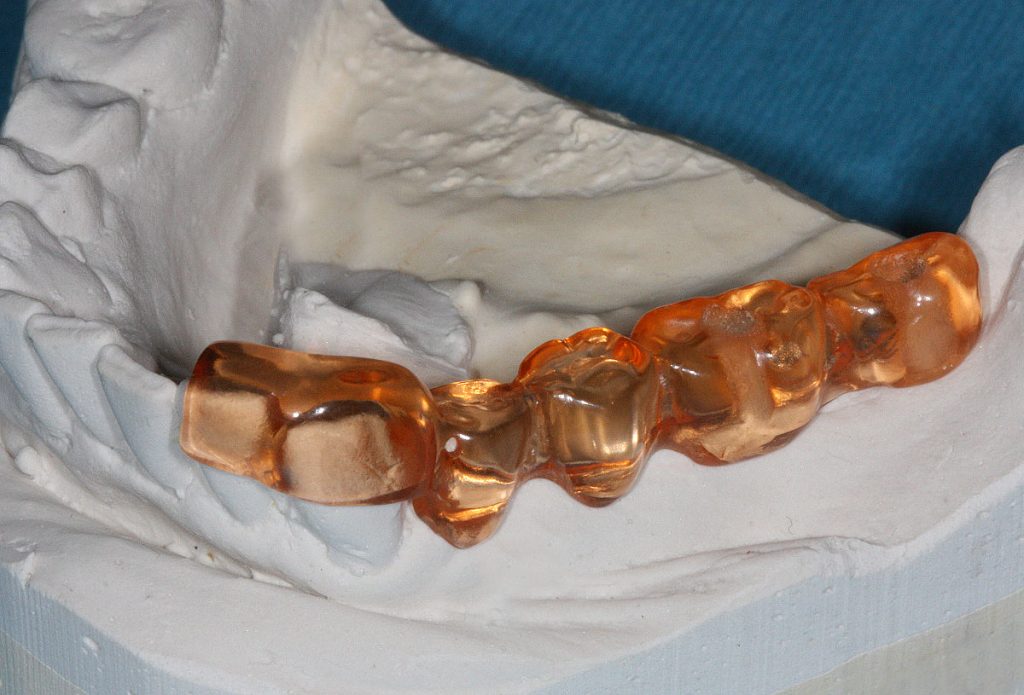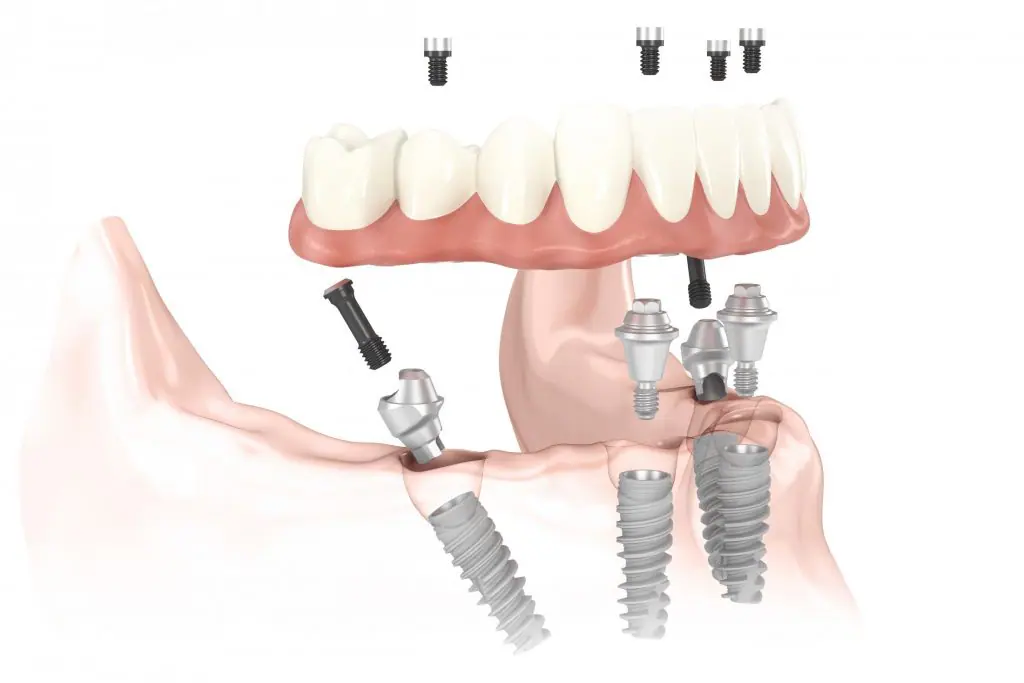Most people dislike removable complete dentures due to struggles with slipping/shifting, demanding maintenance requirements and/or food restrictions.
Dental implants are a great solution to these difficulties and excellent alternative to dentures, but six or eight implants are typically required to restore a full arch of teeth which can be quite an expensive undertaking ($34,000+).
The All-on-4 technique (Teeth in a Day or same day dental implants) offers patients a more affordable solution to this problem, as a complete upper or lower arch of teeth can be supported by four optimally placed dental implants – often for less than $24,000.
In This Guide
- Cost of All-on-4 Dental Implants
- Benefits compared to regular dentures
- Surgical procedure – what to expect
- Potential problems and risks
- What to read next
Cost of All-on-4 Dental Implants
| All-on-4 Type | Cost Per Arch |
|---|---|
| Acrylic Or Composite | $15,000 to $24,000 |
| Porcelain | $21,000 to $30,000 |
For many people, the cost of treatment is the primary factor during the decision-making process, so we’ve collected the data submitted by people who have undergone the procedure. An upper or lower arch of All-on-4 dental implants costs between $15,000 and $24,000. This wide variation is due to a number of different factors, including:
- What diagnostic tests (x-rays, CTs, etc) are carried out beforehand to assess the patient’s health.
- Brand of implants used.
- The quality of the final restoration (denture) and the customization required.
- How many dentists/professionals are involved. Getting everything done in one place is more cost-effective.
- The experience and skill of your implant dentist(s) or oral surgeon(s).
- The location of your dentist. Typically cheaper in areas with lower cost of living.
In some cases, your dental insurance will cover part of the fee charged to restore your new teeth, but most providers don’t allow you to claim the cost of the surgery itself. This is because in spite of the health benefits that can be provided by dental implants, most insurance companies still classify it as a cosmetic procedure.
If you find the All-on-4 system being offered at a substantial discount (well below the average cost range mentioned), it is worth inquiring about the brand of dental implants being used as they might not be from a reputable manufacturer.
If something goes wrong, it is much easier to obtain the components necessary to repair and replace an implant if they are made by a well-known manufacturer. In addition, you are more likely to be able to find a dentist who is willing and able to do the work.
Cost of All-on-4 in Other Countries
| Country | Cost |
|---|---|
| Brazil | $4000 |
| Costa Rica | $7,967 |
| Germany | $5,349 |
| Hungary | $5,855 |
| Ireland | $14,268 |
| Italy | $10,891 |
| Mexico | $9,843 |
| Poland | $4,283 |
| Spain | $7,305 |
| Thailand | $9,950 |
| United Kingdom | $9,316 |
Cost of All-on-6 in Other Countries
| Country | Cost |
|---|---|
| Brazil | $6,000 |
| Costa Rica | $9,613 |
| Hungary | $7,967 |
| Italy | $13,069 |
| Mexico | $12,016 |
| Spain | $8,910 |
| Thailand | $13,768 |
| United Kingdom | $12,681 |
Benefits Compared to Regular Dentures
| All-on-4 | Removable Dentures | |
|---|---|---|
| Jawbone | Stimulates jawbone to promote bone growth | Bone loss over time |
| Support | Fixed to jawbone like natural teeth | Sits on gums - can slip and cause discomfort |
| Feeling | Feel like natural teeth | Take time to get used to. Palate is covered by denture. |
| Longevity | Can last a lifetime | Typically last 7 to 15 years |
| Maintenance | Brush and floss same as for regular teeth | Need to removed for cleaning |
| Appearance | Look close to the real thing. Supports your cheeks and lips | Can be noticeable if they come loose or cause discomfort |
| Speech | No issues | May interfere with speech |
| Eating | No limitations | Must be careful, avoid hard/sticky foods |
| Invasiveness | 1 or 2 invasive surgeries | No surgery required |
The benefits of All-on-4 implants over regular dentures include:
Bone Preservation
Dental implants help to preserve the bone in the jaw. In comparison, dentures can accelerate this bone loss due to the pressure of the denture sitting on the gums and the underlying jawbone.
Increased comfort
The restoration is supported by implants instead of gum tissue, so it does not rub or create sore patches.
Improved diet
Denture wearers need to avoid certain foods that are difficult or nearly impossible to eat because they are too hard or crunchy and could damage the denture. Implants are strong enough to withstand these forces, allowing you to eat a more healthy and varied diet and enjoy increased bite strength.
Improved self-confidence
Implant supported teeth do not move around when you eat or speak, so you can socialize without any fear of embarrassment resulting from your teeth moving or slipping out of position.
Improved appearance
Tooth and bone loss in the jaw affects facial dimensions and can make you look years older than you actually are. All-on-4 teeth are constructed to replace height lost in between your upper and lower jaws, and will support your cheeks and lips.
No need for messy adhesives
Teeth will be permanently fixed to the dental implants.
Surgical Procedure – What to Expect
The procedure was originally developed in the 1990’s by the Portuguese dentist Paulo Malo who worked in conjunction with Nobel Biocare, one of the best known dental implant companies in the world.
Your dentist will evaluate your mouth by performing various diagnostic tests including a CT scan and dental x-rays to measure the amount of available bone in your jaw and its density. They may also use special 3D dental imaging software to make an accurate diagnosis, plan the implant placement and create surgical guides that enable the dentist to insert the implants into exactly the right position.

The technique involves placing two implants at the front of the arch, in the positions normally occupied by your incisors (front teeth) and two implants placed beside them – one on each side.
These are placed at a 45 degree angle tilting away from the front implants. The angle helps to maximize the use of bone in this area as slightly longer implant posts can be used for the angled implants, providing greater support for the replacement teeth. These four implants can support an entire arch of twelve or fourteen teeth.

A new, temporary fixed bridge is created prior to the implant surgery and will be modified to provide a personalized fit immediately after the posts are placed. Since there are only four posts to fit the restoration onto, the entire process is relatively quick and you will leave with your new teeth in position and ready to use.
It is important to note that your new set of teeth are temporary as your dental implants still need time to heal and integrate with your jawbone. Your gums and jawbone should be fully healed after three to six months. At this stage, your dentist will remove your temporary teeth and can take impressions for the permanent implant supported fixed bridge which will be stronger and fit more comfortably.
Potential Problems and Risks
All types of oral surgery carry some amount of risk, and although the success rate for dental implants is around 95%, a number of different problems are possible and a small percentage will fail.
It is vitally important for anyone with dental implants to make sure they are thoroughly cleaned frequently in order to keep them free from plaque and food debris. Regular check-ups and professional cleanings are also essential. With proper planning and care, the risks can be minimized. All-on-4 is a very specialized technique so it is important to make sure you choose the right surgeon who has the proper training and experience.
This procedure is not suitable for everyone, but is worthy of consideration by anyone who is missing a complete arch of teeth.
What to Read Next
- Find a Dentist Using Our Clinic Locator Map
- Dental Implants vs. Dentures
- What Are Mini Dental Implants?
- Dentures Cost: Partial, Full, Permanent & Immediate
- Dental Implant Before and After Photos
Over to You
Looking into this procedure or already had it done? Let us know in the comments how much you paid or have been quoted as well as what city you’re in so that others can compare and discuss.
Had implants in lower, cost was @ $15k. Six years later, implants failed. Two bone grafts, new implants, new lower overdenture… $20k! Insurance won’t pay because it was less than 10 years between! A $3 piece of acrylic with two little buttons inside (for the implants to attach to), $11,000! I don’t care how good they are, it’s a piece of plastic! And No, that does not include the implants. Separate costs for surgery and new implants, @ $6000.
Upper arch done. 2019 – Dallas, TX – $18,000
If I was to do this in Mexico, do they have some kind of payment plan? And would they accept American dental insurance?
PS. Complaining about having to eat soft food for a while is a misnomer. If you’re teeth are falling out, breaking or simply messed up, chances are, you are ALREADY eating soft food.
Not when your comparing teeth lol. When using dentures you have to avoid hard and sticky food. With four on alls you don’t have to worry about it. XD
I have an all on 4 upper bridge. It is acrylic and titanium and has broken 5 times in 4 years. You cannot eat just anything. Hard items such as hard tac, almonds, ice etc can fracture the bridge. You should avoid anything that pulls on the front teeth such as hard protein bars, biting into apples, corn on the cob, taffy etc. as it can fracture the bridge. If you are away from home, it can be a real challenge getting into a prosthadontist for repairs. The last time my bridge fractured involving 3 front teeth, I had to fly back home, (1000 miles) for repairs.. I am considering a Zirconia replacement. It has been a disappointing and frustrating time.